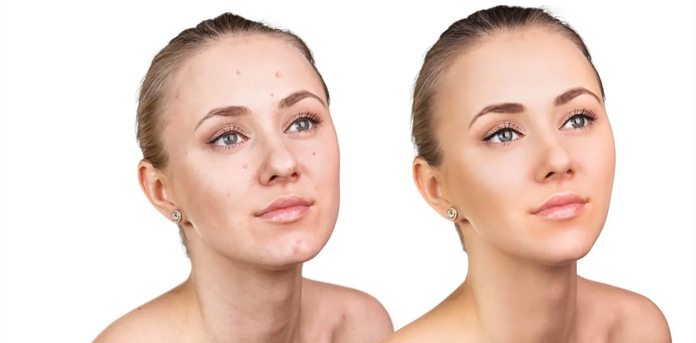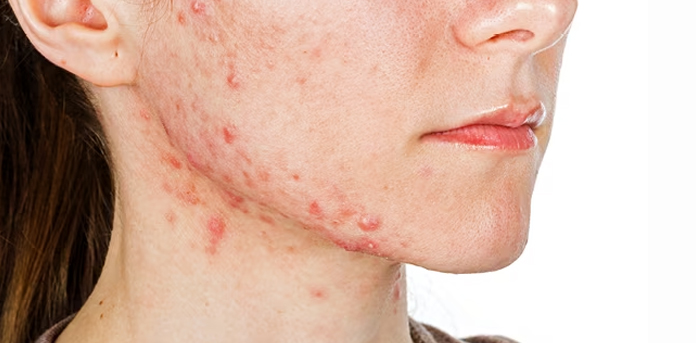Hormonal acne is a typical skin disorder that affects people regardless of their age. While many elements can contribute to acne, hormonal imbalances play a major role in its growth. Hormonal acne can arise during various stages of life, from adolescence to adulthood and even during pregnancy or menopause.
What Causes Hormonal Acne?
Hormonal acne is caused by fluctuations in hormone levels, particularly androgens like testosterone, which stimulate the sebaceous glands to produce more oil. This excess oil, combined with dead skin cells and bacteria, can clog pores, leading to acne breakouts. Understanding the role of hormones in acne formation is crucial to finding effective solutions.
Hormonal Acne In Adolescence
During puberty, our body undergoes several changes, especially hormone production. Such changes can impact sebaceous glands in your skin. When the androgens level increases it stimulates the sebaceous glands to produce more sebum. When sebum gets mixed with dead skin cells, it clogs pores and results in acne breakouts. Hormonal acne commonly occurs as whiteheads, blackheads, papules, pustules, or cysts on the face, chest, and also back.
Tips For Managing Teenage Breakouts
As hormonal acne in adolescence is a natural feature of growing up, there are several effective methods for teenagers to manage acne and maintain clear skin:
Adopt A Constant Skincare Routine
- Wash your face two times per day with a gentle and oil-free cleanser to remove dirt and extra oil.
- Avoid scrubbing your skin too harshly because it can worsen inflammation.
- Use non-comedogenic moisturizers and keep your skin hydrated. Don’t clog pores.
Hands-Off Approach
- Avoid touching or picking pimples, as it can raise bacteria and leads to scars.
- Keep your hair away from your face, as hair products and oils can exacerbate acne.
Avoid Oil-Based Makeup
- Opt for oil-free, non-comedogenic makeup products to prevent pore blockage.
- Remove makeup before going to bed to allow the skin to breathe.
Maintain Your Diet
- Although diet alone may not cause acne, some people find that some specific foods trigger breakouts. Pay attention to your diet and identify any potential triggers like sugary or greasy foods.
Stay Hydrated
- Drink plenty of water to keep your skin hydrated and support overall skin health.
- Aim at drinking 8 to 10 glasses of water per day.
Manage Stress
- Stress can worsen hormonal imbalances and acne. Engage yourself in stress-reducing activities like exercise, yoga, meditation, or hobbies you enjoy.
Use Over-the-Counter Acne Treatments
- Look for products that contain benzoyl peroxide or salicylic acid, which can help unclog pores and reduce inflammation.
Hormonal Imbalances in Adulthood
Acne is usually considered a teenage problem, however, it can persist or develop anew in adulthood, specifically in women. Adults are mainly affected by hormonal imbalances that occur during different life stages, such as menstruation, pregnancy, or menopause. These hormonal changes can promote acne breakouts in adults, causing frustration and affecting self-esteem.
Treatments

There are various treatment options available for hormonal acne, ranging from topical solutions to hormonal therapy. It’s essential to understand the potential side effects and considerations for each treatment method.
Topical Treatments
- Retinoids: Topical retinoids, such as tretinoin, adapalene, or tazarotene, can help unclog pores and promote cell turnover, reducing acne lesions over time.
- Benzoyl Peroxide: This ingredient has antibacterial properties and helps reduce inflammation in acne-prone skin.
- Salicylic Acid: Salicylic acid is an exfoliating agent that can help remove dead skin cells, preventing pore blockage.
- Antibiotics: Topical antibiotics like clindamycin or erythromycin can help control acne-causing bacteria.
Oral Medications
- Birth Control Pills: For women with hormonal acne, certain birth control pills containing estrogen and progestin can help regulate hormone levels and reduce acne.
- Spironolactone: This medication is an androgen receptor blocker that can be prescribed to reduce the effects of androgens on the skin, helping to control hormonal acne in women.
- Oral Antibiotics: In cases of severe inflammatory acne, oral antibiotics like doxycycline or minocycline may be prescribed to reduce bacteria and inflammation.
Hormonal Therapy
- For severe cases of hormonal acne in women, hormonal therapy may be recommended. It involves using medications like oral contraceptives or anti-androgens to regulate hormone levels and control acne.
Lifestyle Changes
- Diet: A balanced diet rich in fruits, vegetables, and whole grains can contribute to overall skin health. Reducing the intake of processed foods, sugar, and dairy products may also help some individuals with hormonal acne.
- Stress Management: High-stress levels can worsen hormonal imbalances and trigger acne breakouts. Incorporating stress-reduction techniques like meditation, exercise, or yoga can be beneficial.
- Skincare Routine: Use gentle, non-comedogenic skincare products and avoid excessive scrubbing or harsh treatments that can irritate the skin.
Natural Remedies
Natural remedies can be a gentle and effective way to complement conventional treatments for hormonal acne. While they may not work for everyone, many individuals find relief and improvement in their skin by incorporating these remedies into their skincare routine. Here are some natural remedies:
- Tea Tree Oil: Tea tree oil has natural antibacterial properties that can help reduce acne-causing bacteria on the skin. Dilute a few drops of tea tree oil with carrier oil (such as jojoba or coconut oil) and apply it to affected areas with a cotton swab.
- Green Tea: Green tea contains antioxidants and anti-inflammatory compounds that can soothe inflamed skin and reduce redness. Brew green tea, let it cool, and use a cotton ball to apply it as a toner or use green tea-infused products.
- Witch Hazel: Witch hazel is a natural astringent that can help remove excess oil from the skin and reduce inflammation. Apply witch hazel to the affected areas using a cotton ball.
- Aloe Vera: Aloe vera has anti-inflammatory and healing properties, making it beneficial for calming irritated skin and promoting the healing of acne lesions. Use pure aloe vera gel directly from the plant or look for products containing a high percentage of aloe vera.
- Apple Cider Vinegar: Apple cider vinegar has antibacterial and exfoliating properties. Dilute apple cider vinegar with water (1:3 ratio) and apply it to the skin with a cotton ball as a toner.
Expert Opinions Regarding Hormonal Acne
Dr. Diane Berson, MD, FAAD:
Dr. Diane Berson who is a board-certified dermatologist and a fellow of the American Academy of Dermatology mentioned in interviews and articles that hormonal changes, especially during puberty, menstruation, pregnancy, and menopause, can cause acne. She highlights the role of hormones, particularly androgens, in increasing sebum production and promoting acne formation.
Dr. Joshua Zeichner, MD, FAAD:
Dr. Joshua Zeichner is a well-known dermatologist and a spokesperson for the American Academy of Dermatology (AAD). He often highlights the significance of individualized treatment plans for hormonal acne. He considers that while hormonal therapies like birth control pills and spironolactone can be effective, they should be used under the guidance of a healthcare professional.
Studies Related To Hormonal Acne
This study highlights the role of hormones in acne. It shows how hormonal changes, specific androgens like testosterone, effects sebum production and the development of acne. This study shows the importance of understanding hormonal factors in managing acne.
This study shows the relationship between acne and smoking. Though the main focus is not only on hormonal acne, it highlights the potential impact of lifestyle factors like smoking, on acne development. The study shows that smoking may worsen acne due to its effect on hormonal balance and skin health.
FAQs
What is hormonal acne, and what causes it?
Hormonal acne is a type of acne that is caused by hormonal fluctuations, especially androgens like testosterone. These hormones can boost the sebaceous glands to produce more oil, leading to clogged pores and acne breakouts. It generally occurs during puberty, menstruation, pregnancy, and menopause, but it can also affect adults with hormonal imbalances.
How can hormonal acne be managed effectively?
It can be cured effectively with the help of different treatments, such as topical medications, oral medications (e.g., birth control pills or anti-androgens), and lifestyle changes. Consulting with a dermatologist is crucial for personalized treatment plans and optimal results.

